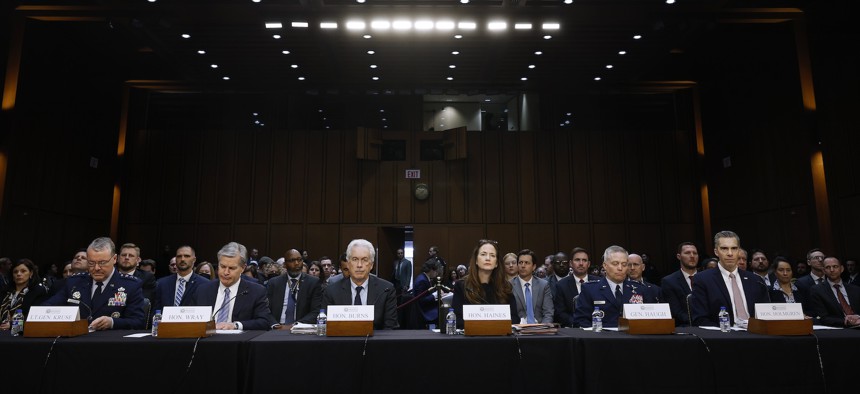China, Russia and Iran capable of disrupting 2024 elections, intel assessment warns

Intelligence officials prepare to brief members of the Senate Select Committee on Intelligence at the annual Worldwide Threats hearing on March 11, 2024. Chip Somodevilla/Getty Images
Three nations have the means of deploying campaigns attempting to scramble election outcomes in November, according to the intelligence community’s annual worldwide threat assessment.
The intelligence community says that China, Russia and Iran are capable of and willing to launch cyberattacks seeking to disrupt the U.S. presidential election in November, according to an assessment released Monday by the Office of the Director of National Intelligence.
The annual threat assessment which collates findings from U.S. spy agencies released at the cusp of a high profile Senate hearing examining worldwide threats to U.S. national security, which included vast analysis of cyber and technology threats.
Misinformation and disinformation operations that seek to sway public opinion of electoral and other political processes “are increasingly deployed cheaply by an array of adversarial actors,” said Sen. Mark Warner, D-Va., who chairs the Senate Intelligence Committee, in opening remarks.
China may attempt to influence election outcomes in November “because of its desire to sideline critical of China and magnify U.S. societal divisions,” the assessment says. That may include Chinese state-run TikTok accounts, which had targeted candidates in the 2022 midterms, it notes.
“Even if Beijing sets limits on these activities, individuals not under its direct supervision may attempt election influence activities they perceive are in line with Beijing’s goals,” the readout says.
Moscow views the coming elections as opportunities to deploy influence operations, it adds. Russia is contemplating how election outcomes will affect U.S. support for Ukraine and “probably will attempt to affect the elections in ways that best support its interests and goals,” ODNI notes.
Iran, meanwhile, “may attempt to conduct influence operations” aimed at U.S. elections, having done so in the past, it adds. Iranian-linked hackers became the subject of major headlines last year after they deployed cyberattacks targeting logic controllers in U.S. water treatment plants.
Officials fear that a loss of faith in electoral systems at home could lead to a repeat of the widespread voter fraud claims that occurred during the 2020 presidential election and culminated in the January 6 attack on the U.S. Capitol.
On the domestic front, content moderator staff reductions at social media companies have also been deemed a major risk to election integrity, and election workers worry they will face threats of violence from voters who don’t accept the polling results.
The Cybersecurity and Infrastructure Security Agency has not been in touch with social media firms about election security specifics, a senior CISA had previously said. The lack of communication with social media companies is likely linked to a pending Supreme Court case that would consider whether Biden administration agencies have the ability to stay in contact with social media companies about removing posts that could contain disinformation.
Election interference risks are not as novel as first reported nearly a decade ago, but officials and researchers fear that consumer-facing AI tools or similar offerings available on the dark web will supercharge hackers’ attempts to breach election infrastructure or craft realistic-sounding campaigns that seek to sway voters away from the polls or instill distrust in election outcomes.
U.S. voters got a taste of this in January when a Texas-linked robocalling operation allegedly disseminated phone calls featuring an AI-generated voice of President Joe Biden during the New Hampshire primary, urging Democrats to “save” their votes for the November ballot. The fallout ended in a total ban on AI voices being used in robocall schemes in the U.S, led by the Federal Communications Commission.






